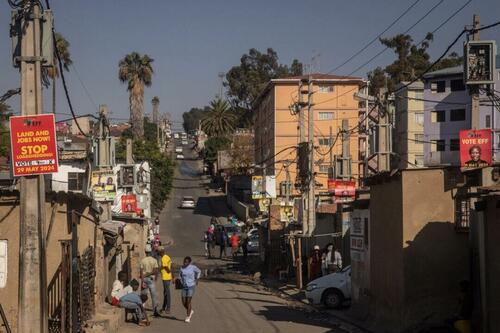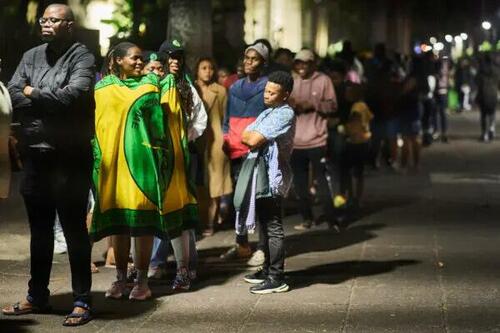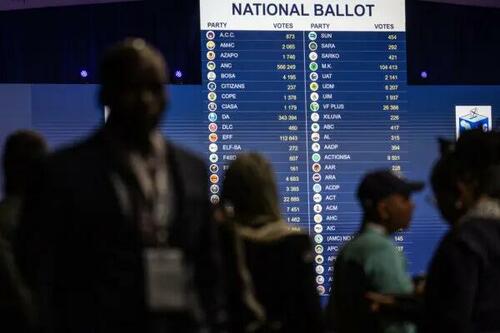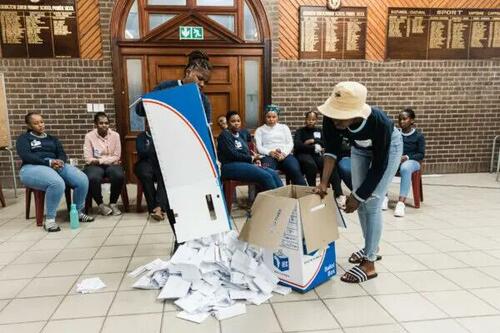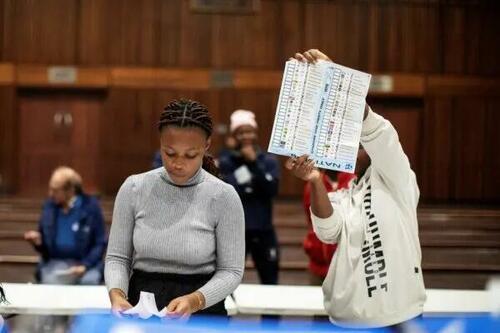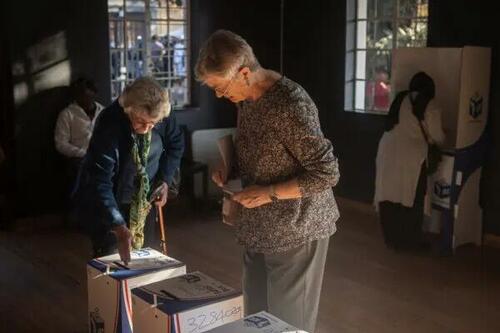Ruling Party ‘Obliterated’ In South Africa Election
Authored by Darren Taylor via The Epoch Times (emphasis ours),
“South Africa’s a new country today, but I’m really afraid of that. We don’t know what that looks like,” Pieter Fourie, a middle-aged, middle-class man walking his shaggy Alsatian through autumn leaves on a street in Melville, Johannesburg, said.
His younger companion, Sally Kruger, sighed.
“For many years we prayed to get rid of the ANC [African National Congress]. We watched as it destroyed our beautiful country,” she said, gesturing toward a gaping pothole filled with muddy water.
“But now that the ANC’s fallen so badly, so fast, in such a shocking way, I’m finding it hard to find a reason to celebrate.”
Ms. Kruger’s voice trailed off, almost drowned out by screeches from a flock of African ibises.
“I mean, look at what’s rising to replace it!” she exclaimed. “Something even worse. We were in trouble under the ANC. Now we’re in even bigger trouble.”
The couple’s insightful musings reflect the concerns of many citizens in Africa’s largest economy, and its most developed democracy, as the implications of the May 29 election filter through the suburbs, townships, and villages of this “Rainbow Nation” of 62 million.
The ANC, in power since Nelson Mandela led it to a sweeping victory in South Africa’s first multiracial, multiparty poll in 1994 to end white minority apartheid rule, has captured less than 40 percent of the vote, with almost all ballots counted.
The stunning result is reverberating around the world and was predicted by only one survey in the runup to the election.
Most polls had support for the ANC at about 45 to 48 percent.
That outcome would’ve still pushed it into a coalition government, but one that would’ve enabled it to continue exerting dominance in terms of policy direction with support from a few small parties over which it could wield its authority.
Now, if it’s to hold on to a semblance of power, the ANC will have to form a coalition with a larger opposition party, or parties, which it won’t be able to push around.
By law, the new government must be announced within 14 days, so it doesn’t have much time to negotiate its way back into the Union Buildings.
The ANC’s potential partners could not be more different.
On the one side is the centrist Democratic Alliance (DA), which has won 22 percent of the vote and up until now has been the official opposition.
The DA is led by a middle-aged white man, John Steenhuisen, who’s often accused by the ANC of wanting to preserve “white privilege.”
The DA is pro-business and pro-West, and wants to end affirmative action and replace it with “merit-based” employment, privatize state-owned companies, and weaken the “untrammeled” power of ANC-affiliated labor unions.
These policies are “poisonous,” to the ANC, the party’s secretary-general, Fikile Mbalula, said in an interview with The Epoch Times shortly before the election.
On the other side of the chasm are two radical leftist parties led by charismatic, allegedly corrupt black men who once vowed to “die for the ANC”: Umkhonto we Sizwe (MKP), whose figurehead is former President Jacob Zuma, 82, and the Economic Freedom Fighters (EFF), whose “commander-in-chief” is Julius Malema, 43.
Together, the MKP, with 15 percent, and the EFF, with a little less than 10 percent, have won almost a quarter of votes cast.
If they form a coalition, they could replace the DA as the official opposition.
The MKP and EFF are “natural bedfellows,” according to professor Dirk Kotze, governance expert at the University of South Africa in Pretoria.
Both are “proudly Marxist” and, like the ANC, are fervent supporters of regimes in China, Russia, Iran, and Zimbabwe.
Both accuse the ANC of “selling out” to white capitalists.
Both advocate seizing white-owned land, including farms, and “nationalizing” mines and banks.
MKP and EFF say all forms of private wealth must be “equally redistributed” among South Africa’s estimated 27 million poor people, mostly black.
Both want to cut trade ties with Western countries in favor of closer cooperation with a “Multipolar World Order” led by Beijing.
Both have made statements vilifying white citizens; Mr. Malema has twice been found guilty of racist hate speech against white people.
Should the ANC choose to partner with one, or both, of these extremist parties to form a coalition government, financial experts say it’ll trigger taxpayer and investor flight and herald the collapse of South Africa’s economy, which is built on gold, platinum, an advanced banking system, and agriculture.
“There’s a faction inside the ANC that remains pro-Zuma and actually admires Malema and agrees with EFF and MKP policies,” Melanie Verwoerd, an independent political analyst and former ANC member of parliament, said.
“Then there’s a more moderate part of the ANC, under [current President] Cyril Ramaphosa, that realize the terrible implications of signing up with either MKP or EFF,” she told The Epoch Times. “This part will prefer to go into coalition with the DA, but they probably don’t have the upper hand at the moment because the ANC under Ramaphosa has performed so poorly in the election.”
Mr. Steenhuisen told The Epoch Times the DA “remains willing to listen to the reasonable people still left” in the ANC.
“We’ll do what’s best for all South Africans,” he said. “We must keep the country out of the hands of the extremists. We must believe them when they tell us exactly what they’ll do with power. They’ll sow racial hatred. They’ll steal private property. They’ll launch a pogrom against white people and legal and illegal African migrants. They’ll sell the country to the Chinese and Russians. They’ll sink more millions into poverty by antagonizing Western investors and trade partners. They’ll make the ANC’s corruption look like small change.”
ANC’s implosion
Mr. Kotze told The Epoch Times the ANC has been a “victim of its own folly and blindness.”
“It’s still a political force in South Africa, but no longer a force to be reckoned with,” he said. “This election has obliterated it.”
Mr. Kotze added that voters had “lambasted” the ANC for 20 years of “consistent failures” on almost all fronts, including governance, the economy, and law enforcement.
“Things started well under Mandela, and things were quite good for a while under [President Thabo] Mbeki,“ he said. ”But when Mbeki started losing control of the ANC around the mid-2000s, to people who just wanted to steal and had no idea how to govern, that’s when South Africa’s downward trajectory began.”
In the months leading up to the May 29 vote, political think-tanks, analysts, and experts branded it the most significant in 30 years.
The ANC was badly wounded, they said, broken by a criminal class within its ranks that had stolen billions of rands, its corruption and mismanagement bankrupting state-owned enterprises to such a degree that ports and railways no longer work, electricity outages plunging South Africa into darkness and economic paralysis on a daily basis.
“Entire towns have been wiped off the face of the earth by the maladministration of ANC municipalities,” Prince Mashele, of South Africa’s Centre for Politics and Research, said.
Failure to curb violent crime, including a murder rate that now stands at 84 per day, also dealt it a “death blow,” he said.
Mr. Kotze said the ANC’s black economic empowerment and “cadre deployment” policies have made people close to the ruling party extremely rich but failed to pull millions out of extreme poverty, reflected in the world’s highest “real” unemployment rate, 41 percent.
Going into the election, though, Mr. Ramaphosa would only acknowledge that his party had made “a few mistakes,” never explaining exactly what those mistakes were, and never apologizing.
“That was a huge miscalculation on his part,” Mr. Mashele said.
As the election approached, the ANC remained confident, in public at least, that voters would elect it back into government by a “large majority,” in Mr. Ramaphosa’s words.
“South Africans know we are the only ones who can improve their lives,” the president said at a rally in Soweto.
Mr. Kotze said the ANC’s “arrogance harmed it immensely” in the election.
Even when the scale of the destruction suffered by the party became clear on May 31, senior ANC official Gwede Mantashe, one of Mr. Ramaphosa’s closest aides, told journalists: “Leave predictions and polls aside. Votes are still flowing in. I’m optimistic we’ll easily reach more than 50 percent.”
Amid the melee of the results hub of South Africa’s Independent Electoral Commission near Johannesburg, analyst Wayne Sussman told The Epoch Times: “When counting began at pace on Thursday, I confidently projected the ANC would end on 45 percent. To have the ANC now at around 40 percent, with almost all results declared, tells you the tale of the damage suffered by Africa’s oldest former liberation movement. This is a party that got 70 percent of the national vote in 2004! Its implosion has been amazing. A historic new era of coalition governance has begun, and it’s probably going to be extremely volatile and chaotic.”
That volatility and chaos has already begun: News that the ANC will have to form a coalition government, and the uncertainty this will bring, has caused prices of shares in major South African companies and the value of the rand to plummet.
A week ago, the rand was trading at 18 to the United States dollar; now it’s at almost 19.
Tyler Durden
Mon, 06/03/2024 – 02:00
via ZeroHedge News https://ift.tt/g6OTqmD Tyler Durden
